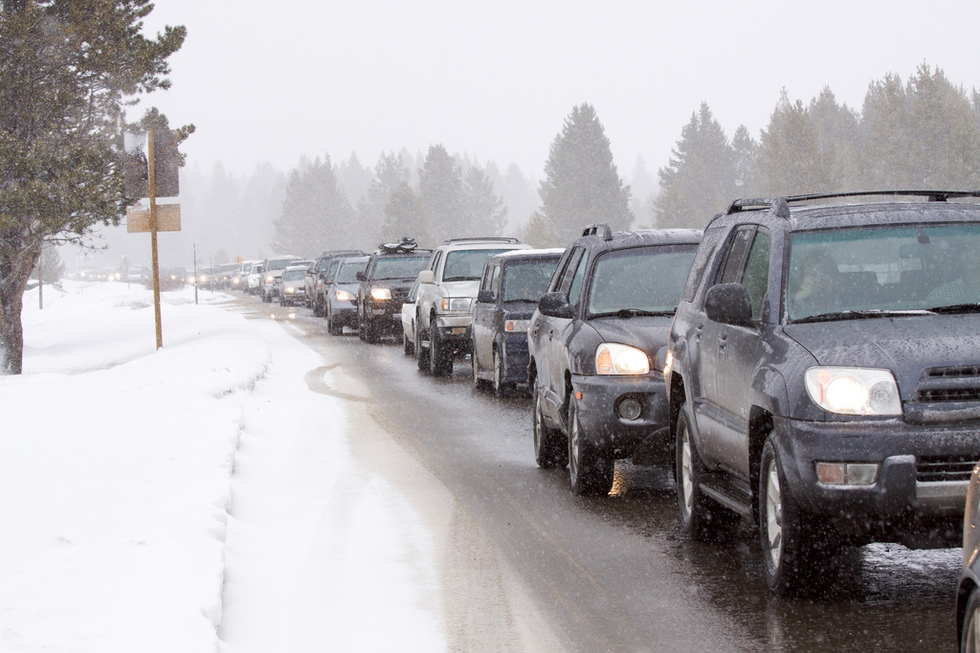For the majority of travelers, heading home for the holidays involves hitting the road. That translates to crowded highways, and drivers making stupid mistakes because they're driving in areas they don't know well (and might be having to check directions as they steer). Winter storms, too, can make holiday driving challenging as can fellow drivers who may have overindulged in the spiked egg nog at the season office party.
So if you’re planning on taking a road trip for the upcoming holidays, follow these smart tips from experts.
Coddle your car
“Every few months, and especially before a long trip, it is necessary to check your car's fluid levels,” says Chip Wade, a safety expert for Liberty Mutual Insurance. “Coolant, brake, automatic transmission, oil, power steering, and windshield washer fluids are the biggies. Even if it's not quite time to refill, it's better to be safe than sorry.”
That goes for more than just fluids. “Getting regular car tune-ups like oil and air filter changes and tire rotations will also play a big role in preventing breakdowns,” he notes.
Plan for the worst
“Keep a winter survival kit in your car,” advises Chris Hayes, who specializes in transportation and risk control for Travelers Insurance. “It should include an ice scraper, snow shovel, sand/salt, warm clothes, and energy bars or trail mix.” Other experts suggest carrying blankets, an old towel (in case you need to make repairs under the car), jumper cables, duct tape, a car jack, and a cellphone charger.
And don’t forget to check on the state of your spare tire. According to a Liberty Mutual holiday travel poll, 3 out of 10 respondents admitted they don’t take that important step before they hit the road. “Imagine getting a flat only to find out that your spare is also flat!” exclaims Wade.
Drive intelligently
“Keep your eyesight focused on the horizon of the road—that way you’ll be able to see road hazards when they are still far away,” advises Mark Warner of BestUsedTires.com. “This will also make it easier to drive smoothly, and recover from slides in poor weather conditions. Be sure to watch for brake lights coming on because this can be a sign that someone in front of you is coming across a hazard in front of them.”
“You also want to maintain a safe following distance behind the car that you are following—at least 2 seconds behind the car in front of you,” continues Warner. “This will help to give you sufficient time to react to whatever might happen on the road in front of you.”
And use common sense about when you’ll be driving, says Maggie McCombs of Creative Lodgings Solutions, a company that works with a lot of road trippers. “Avoid driving when you’re tired,” she says. “We don't care how many miles you want to log on your way to Grandma's house: inclement weather driving demands max alertness.”
Be especially careful going into and out of malls
“Mall parking lots are among the most dangerous places to drive during the holidays so be on your guard,” says Warner. “You'll be greeted by distracted drivers, fighting toddlers, and sometimes questionable parking lot designs.”
Take the pedal off the metal and brake carefully
“Decrease speed by about 50% in icy/snowy conditions,” says McCombs. “And remember that while all wheel drive (AWD) might keep you moving in icy conditions, it will not help you stop. Brake slowly and carefully, lightly pumping the brakes. This rule applies to rainy conditions, too.”
Warner agrees, adding: “Get into the habit of ‘taking the slack out’ of your car's brakes when you are approaching a hazardous situation. It takes time to move your foot from the gas to the brake and this can cost you precious stopping distance. If you have already moved your foot and applied a minimal amount of pressure to the brake, you will be able to react and stop your car quicker if the need arises.”
Don’t play chicken with the snowplows
“Avoid passing snowplows and sand trucks,” says Wade. “The drivers can have limited visibility, and the road in front of them could be worse than the road behind.”
Don’t let your car run low on gas
“Maintain at least a half tank of gas during the winter season. This helps ensure you have a source of heat if you are stuck or stranded,” says Wade.
Destinations
Trip Ideas
Tips & News






